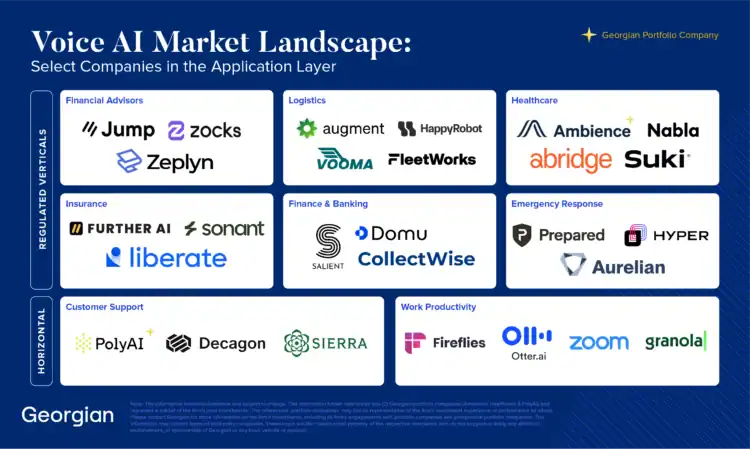Why Georgian Invested in PolyAI (Again)
We are pleased to announce our continued partnership with PolyAI, co-leading their $86 million Series D funding round alongside Khosla Ventures and Hedosophia, with participation from NVIDIA’s NVentures and other returning investors. PolyAI is a leader in the voice assistant market, building lifelike customer experience agents that are designed to handle over 95% of all…
AI Landscape Series
The New AI Technology Stack
This paper introduces our view of a new technology stack that is emerging to support the development of agentic AI.
Agentic Platforms and Applications
This paper explores the technical foundations of AI agents, their potential impact on traditional software and business models and how the software industry is evolving in response.
Agentic AI Infrastructure
This paper explores the agentic and AI infrastructure layer that is being built to help agentic systems reach enterprise scale and reliability.
More insights from the blog
From Static to Adaptive: Scaling AI Reasoning Without the Waste
2025 has been the year of reasoning models. OpenAI released o1 and Google released Gemini 2.0 Flash Thinking in December 2024. DeepSeek R1, an open source reasoning model, hit the market in January 2025. Anthropic, Google, Alibaba, and xAI have all followed suit, all releasing reasoning models throughout 2025.
Why Georgian Invested in Replit
We are excited to announce our latest investment in Replit’s $250 million…
Georgian Releases 2025 AI Adoption Enterprise & Growth-Stage Benchmarks
Compiled in partnership with NewtonX, and leveraging 600+ exec respondents, the report…
A Practical Guide to Reducing Latency and Costs in Agentic AI Applications
Scaling companies that are actively integrating Large Language Models (LLMs) into their…
How to Build Differentiated Agentic AI Products: A Practical Guide
In her latest blog, Asna Shafiq dives into: Identifying potential use cases for agentic AI, starting small to build confidence and tips to differentiate your AI solution.
Why Georgian Invested in Ambience Healthcare
We are pleased to announce Georgian’s participation in Ambience Healthcare’s $243 million…
Data Security in the Age of Agentic AI
AI now lies at the heart of the battle between attackers and defenders, potentially reshaping the dynamics of cybersecurity. While malicious actors exploit AI to identify vulnerabilities and craft sophisticated attacks, security teams are increasingly relying on AI to detect and neutralize threats. In my view, this dichotomy underscores the need to balance innovation with responsible safeguards.
Georgian Purpose Report 2024
This reporting period marked five years since the establishment of Georgian’s Environmental, Social, and Governance (ESG) program. Over this period, we have sought to identify and apply standards that are relevant to our industry, and to explore ways to consider this guidance within our investment processes and operations.
How Vibe Coding is Changing the Economics of Software Development
Software development has changed dramatically in recent years. Developers have moved from copying code from Stack Overflow to using ChatGPT for code suggestions, using Integrated Development Environments (IDEs) with AI-powered autocompletion, to now prompting large language models (LLMs) to generate entire applications. This shift is transforming how engineering teams work and is reshaping the economics of software creation and cybersecurity.





